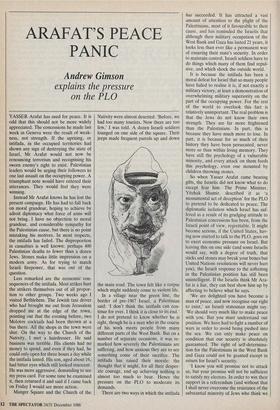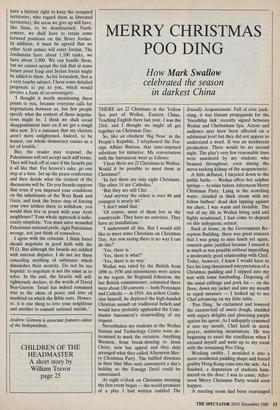ARAFAT'S PEACE PANIC
Andrew Gimson explains the pressure
on the PLO YASSER Arafat has sued for peace. It is odd that this should not be more widely appreciated. The concessions he made last week in Geneva were the result of weak- ness, not strength. If the uprising, or intifada, in the occupied territories had shown any sign of destroying the state of Israel, Mr Arafat would not now be renouncing terrorism and recognising his sworn enemy's right to exist. Palestinian leaders would be urging their followers to one last assault on the occupying power. A triumphant note would have entered their utterances. They would feel they were winning.
Instead Mr Arafat knows he has lost the present campaign. He has had to fall back on moral grandeur, hoping to achieve by adroit diplomacy what force of arms will not bring. I have no objection to moral grandeur, and considerable sympathy for the Palestinian cause, but there is no point mistaking his motives. In most respects, the intifada has failed. The disproportion in casualties is well known: perhaps 400 Palestinian deaths to fewer than a dozen Jews. Stones make little impression on a modern army. As for trying to match Israeli firepower, that was out of the question.
Less remarked are the economic con- sequences of the intifada. Most strikes hurt the strikers themselves out of all propor- tion to other groups. Two weeks ago I visited Bethlehem. The Jewish taxi driver who had brought me out from Jerusalem dropped me at the edge of the town, pointing out that the evening before, two Molotov cocktails had been thrown at a bus there. All the shops in the town were shut. On the way to the Church of the Nativity, I met a hairdresser. He said business was terrible. His clients had no money to spend, and even if they had, he could only open for three hours a day while the intifada lasted. His son, aged about 16, had bitter eyes which still looked innocent. He was more aggressive, demanding to see my press card. For some time he examined it, then returned it and said if I came back on Friday I would see more action.
Manger Square and the Church of the Nativity were almost deserted. 'Before, we had too many tourists. Now there are too few,' I was told. A dozen Israeli soldiers lounged on one side of the square. Their jeeps made frequent patrols up and down the main road. The town felt like a corpse which might suddenly come to violent life.
In a village near the green line, the border of pre-1967 Israel, a Palestinian said: 'I don't think the intifada can con- tinue for ever. I think it is close to its end.' I do not pretend to know whether he is right, though he is a man who in the course of his work meets people from many different parts of the West Bank. But on a number of separate occasions, it was re- marked how severely the Palestinians are suffering, and how anxious they are to see something come of their sacrifice. The intifada has raised their morale: the thought that it might, for all their desper- ate courage, end up achieving nothing is almost too much to bear. Hence the pressure on the PLO to moderate its demands.
There are two ways in which the intifada has succeeded. It has attracted a vast amount of attention to the plight of the Palestinians, most of it favourable to their cause, and has reminded the Israelis that although their military occupation of the West Bank and Gaza has lasted 21 years, it looks less than ever like a permanent way of ensuring their state's security. In order to maintain control, Israeli soldiers have to do things which many of them find repul- sive, and which shock the outside world.
It is because the intifada has been a moral defeat for Israel that so many people have failed to realise it is, if not exactly a military victory, at least a demonstration of overwhelming military superiority on the part of the occupying power. For the rest of the world to overlook this fact is relatively unimportant. The real problem is that the Jews do not know their own strength. They are far more frightened than the Palestinians. In part, this is because they have much more to lose. In part, it is because for so much of their history they have been persecuted, never more so than within living memory. They have still the psychology of a vulnerable minority, and every attack on them feeds this psychology, even one mounted by children throwing stones.
So when Yasser Arafat came bearing gifts, the Israelis did not know what to do except fear him. The Prime Minister, Yitzhak Shamir, described it as 'a monumental act of deception' for the PLO to pretend to be dedicated to peace. The diplomatic isolation which Israel has suf- fered as a result of its grudging attitude to Palestinian concessions has been, from the Israeli point of view, regrettable. It might become serious, if the United States, hav- ing now started to talk to the PLO, goes on to exert economic pressure on Israel. But leaving this on one side (and some Israelis would say, with a degree of truth, that sticks and stones may break your bones but United Nations resolutions will never hurt you), the Israeli response to the softening in the Palestinian position has still been unintelligent. If the Israelis think Mr Ara- fat is a liar, they can best show him up by affecting to believe what he says.
'We are delighted you have become a man of peace, and now recognise our right to exist,' an Israeli statesman might say. 'We should very much like to make peace with you. But you must understand our position. We have had to fight a number of wars in order to avoid being pushed into the sea. We can only make peace on condition that our security is absolutely guaranteed. The right of self-determina- tion for the Palestinians in the West Bank and Gaza could not be granted except in return for Israel's security.
'I know you will promise not to attack us, but your promise will not be sufficient to satisfy my electors. In order to win their support in a referendum (and without that I shall never overcome the resistance of the substantial minority of Jews who think we have a historic right to keep the occupied territories; who regard them as liberated territories), the areas we give up will have, like Sinai, to be demilitarised. Furth- ermore, we . shall have to retain some forward positions on the River Jordan. In addition, it must be agreed that no other Arab armies will enter Jordan. The Jordanians have about 1,100 tanks, we have about 3,900. We can handle them, but we cannot accept the risk that at some future point Iraqi and Syrian forces might be added to them. As for Jerusalem, that is a very touchy subject. I have some detailed proposals to put to you, which would involve a form of co-sovereignty.
'I thought it worth mentioning these points to you, because everyone calls for negotiations between us, but few people specify what the content of those negotia- tions might be. I think we shall avoid disappointment later on if we get a rough idea now. It's a nuisance that my electors aren't more enlightened. Indeed, to be honest, our whole democracy causes us a lot of trouble.'
But, the reader may respond, the Palestinians will not accept such stiff terms. They will back off at once if the Israelis put it all like that. For heaven's sake, go one step at a time. Set up the peace conference and then decide what the content of the discussions will be. Do you Israelis suppose that even if you imposed your conditions on the inhabitants of the West Bank and Gaza, and took the brave step of forcing your own settlers there to withdraw, you would then live in peace with your Arab neighbours? Your whole approach is ludic- rously simplistic. You must salve wounded Palestinian national pride, right Palestinian wrongs, not just think of yourselves.
I agree with the criticism. I think Israel should negotiate in good faith with the PLO. But although the Israelis are riddled with internal disputes, I do not see them conceding anything of substance which diminishes their security. Do not be too hopeful: to negotiate is not the same as to solve. In the end, the Israelis will self- righteously declare, in the words of David Ben-Gurion: 'Israel has indeed remained true to the ideas of peace and love of mankind on which the Bible rests. Howev- er, it is one thing to love your neighbour and another to commit national suicide.'
Andrew Gimson is associate features editor of the Independent.











































































































 Previous page
Previous page